WHAT COULD BE CARRIED
Poems of the Ulster Museum
An Ekphrasis Project by students from the Seamus Heaney Centre at Queen’s, in collaboration with the Ulster Museum.
Renaissance to Romanticism draws together many of the finest pre-1900 Irish, British and European paintings in the Ulster Museum collection. Spanning the 1500s to the late 1800s the works have, for the first time, been arranged regardless of geographical borders. This presentation includes familiar and well-loved paintings, and works which have rarely been on display.
Since 2016, the art collection has been enriched by a series of major acquisitions. To celebrate these, and to show them in context, the art galleries have been re-orientated to give a continuous narrative from the 15th to the 21st century.
The following responses bring these works into present consciousness, and create new narratives reflecting on the meaning of historic art through a contemporary lens.
Stephen Sexton Lecturer in Poetry, Seamus Heaney Centre at Queen’s University, Belfast
The poems and prose brought together in What Could Be Carried are responses to the Ulster Museum’s Renaissance to Romanticism exhibition. Students from the Seamus Heaney Centre at Queen’s University, Belfast have found in these paintings, which represent several centuries, contemporary narratives of displacement and emigration, as well as the ever-present occupations of religion and wealth.
Here imaginary Roman ruins rub shoulders with takes on St Francis, while the unforgettable, mildly tragic ensemble of The Bateson Children watch on from their family portrait. We’re grateful to Anna Liesching, Curator of Art at the Ulster Museum, for her tour of the exhibition and for her enthusiasm for this project.
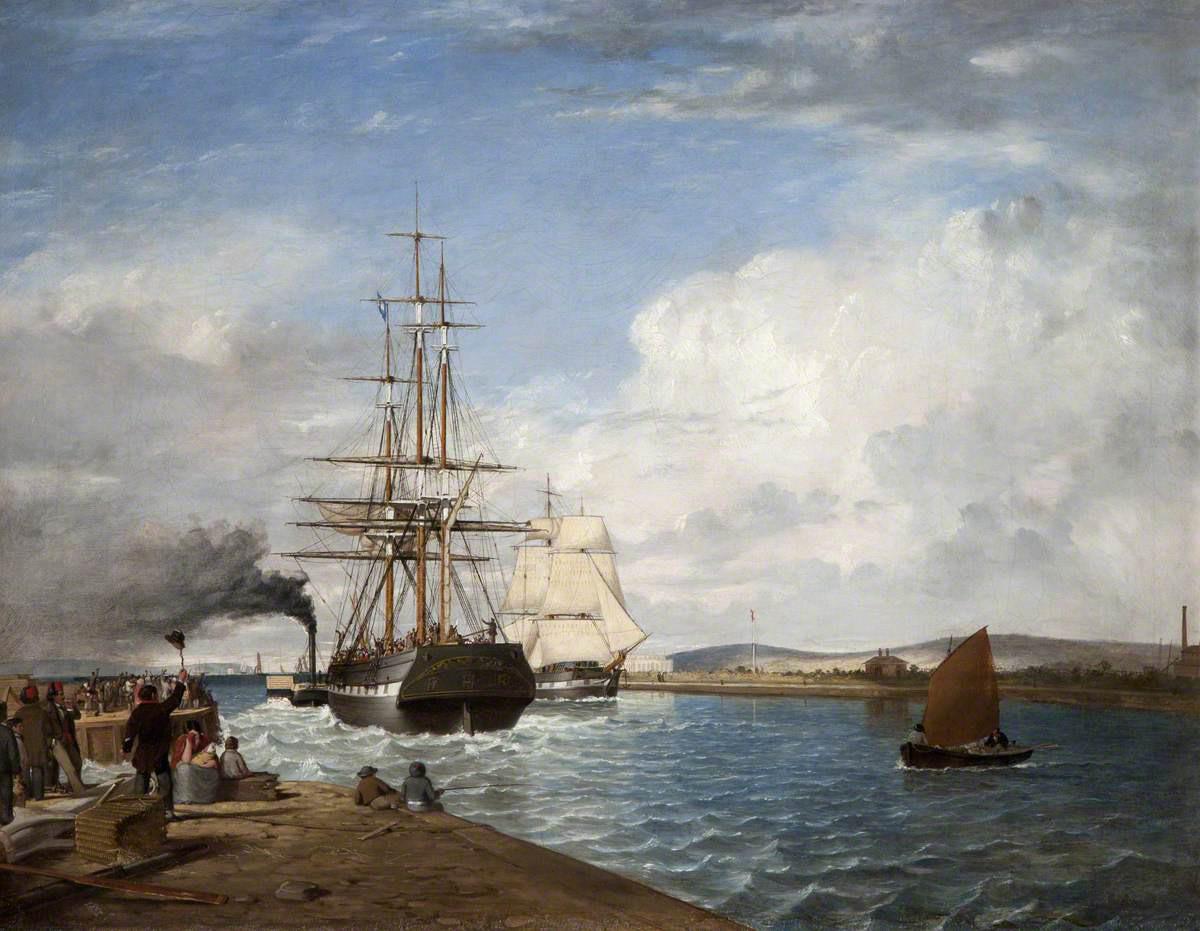 An Emigrant Ship Leaving Belfast by James Glen Wilson (1827 – 1863) Oil on canvas. BELUM.u178 ©National Museums NI Collection: Ulster Museum
An Emigrant Ship Leaving Belfast by James Glen Wilson (1827 – 1863) Oil on canvas. BELUM.u178 ©National Museums NI Collection: Ulster Museum
SHAKEEMA EDWARDS AMERICAN WAKE
after An Emigrant Ship Leaving Belfast by James Glen Wilson
He rose early, encased what could be carried in used boxes, and sat in the kitchen waiting for the house to wake—as though we had slept, as though we hadn’t worn our boots to bed.
We lumbered toward the crowded harbour, where he pressed his palm into our father’s, and mother tugged his coat buttons for assurance that each would survive the crossing.
Over there, he’d be important. We were certain. He’d carve railways into mountains, forge a country out of untamed acres. And he’d write often, detail every undertaking. Yes, we’d hardly miss him.
His ship eased out to sea under a banner of black smoke, father waved his arm sore with those gathered dockside, and mother, shrouding her eyes, turned her back to the water.
FREYA ELLIOTT
A DAY AT THE CASTLE
after View of the Ferry and Castle of Narrow Water by Jonathan Fisher
There’s a little girl in a raincoat and pink plastic wellies running up the stone steps, screeching with laughter. Her mother chases after, and I realise not for the first time in my new adulthood, that I’m far closer to her in age than the child.
I wonder how many children have been chased up those stone steps. In this place that’s stood still, only slowly wearing away all this time.
I wonder how many young lovers have been pulled into hidden corners, for chased kisses or chased smiles.
I wonder how many of us have looked out the narrow cross shaped windows and felt the cold air on our noses as we glimpsed the trees and the river and the hills.
How many feet have slipped on the stone, in leather boots, satin slippers, or pink plastic wellies?
 View of the Ferry and Castle of Narrow Water by Jonathan Fisher (died 1809) Oil on canvas. BELUM.U659 ©National Museums NI Collection: Ulster Museum
View of the Ferry and Castle of Narrow Water by Jonathan Fisher (died 1809) Oil on canvas. BELUM.U659 ©National Museums NI Collection: Ulster Museum
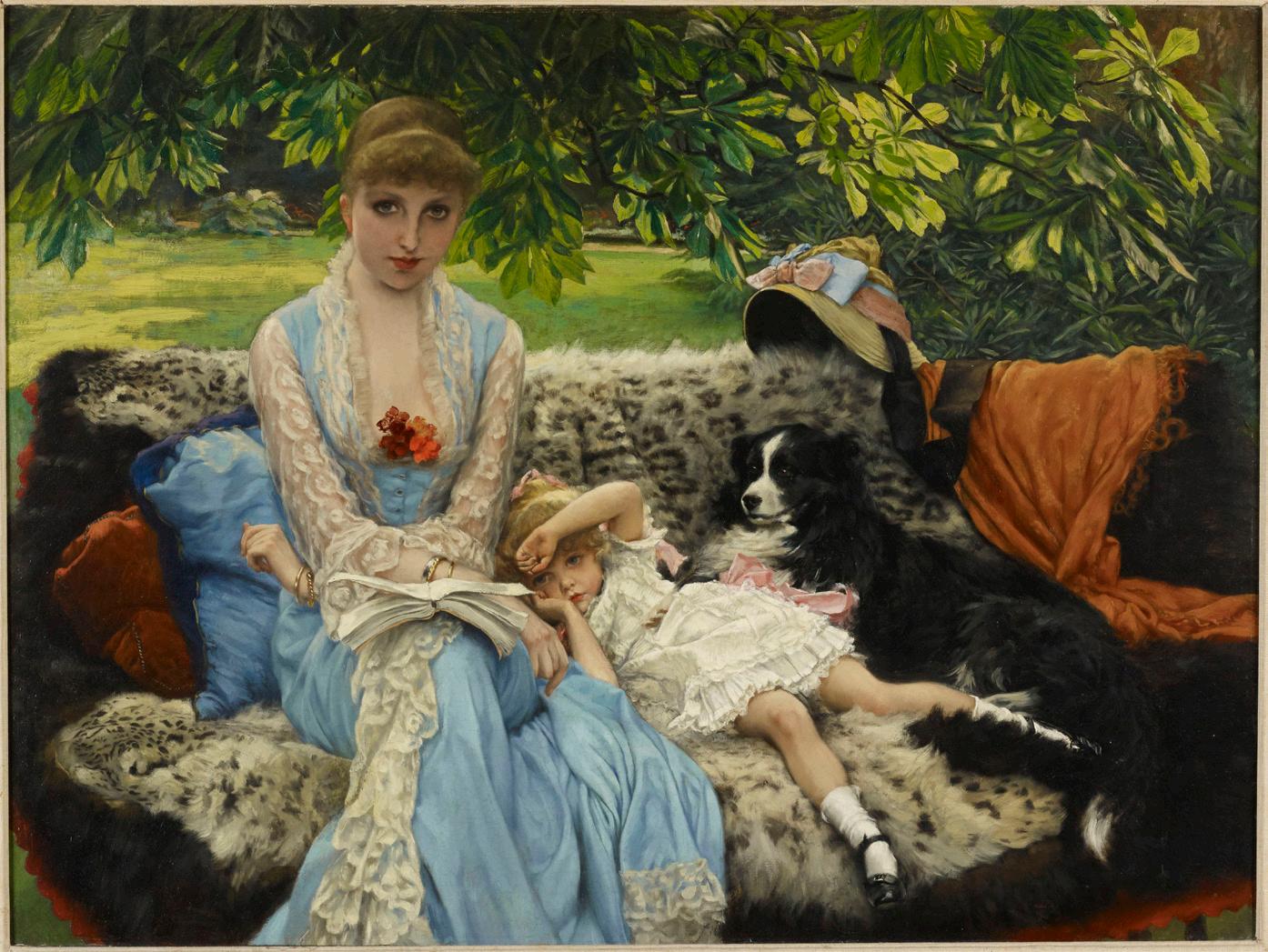 Quiet by James (Jacques) Tissot (1836-1902)
Oil on canvas. BELUM.U2021.3 ©National Museums NI Collection: Ulster Museum
Quiet by James (Jacques) Tissot (1836-1902)
Oil on canvas. BELUM.U2021.3 ©National Museums NI Collection: Ulster Museum
REBECCA EMMET-BOOTH
CARMINE PETALS
after Quiet by James Tissot
I suppose the flower is a sign that he knows. I can still smell the scent of water, salt, iron and soap from washing out my handkerchief, this morning. Not even the St. John’s Wood blossoms can dull the scent in my nostrils.
“Alice, hold still.”
His dark eyes move to the squirming girl and so do the canine eyes of Jaq. Her dress is twisted, the lace creased, but she doesn’t care. I suppose all the more interesting to paint the folds of the mussed material than if she hadn’t moved at all. It isn’t elegant but I like her defiance. I feel like dropping my book, shaking off my pose, rising up and shouting “enough!” The stiffness in my neck agrees.
As a response to my thought, Jaq puts a paw over the girl and draws closer to us both.
I wonder will James paint my boredom. I touched up my face with extra powder to disguise the lack of blush and the chilled paleness, I had developed recently. Rouge to cover where I had bitten my lip and a touch of soot for my eyes.
I glance at Alice. She is shielding the sun from her face. My leg starts to cramp but I can’t move. I had already been chastised for moving for a clumsy bee, just before he painted my nose. I can see James’s frustration. He will apologise later with kisses down my neck but right now I want to scream. The cramp is gripping tighter in my calf. I shift to my left. Alice squiggles too. I jiggle my foot up and down, like an impatient child.
“Stillness, mo mhuirnín.”
I want to reach for my bonnet but the painting is ‘en cour’ and any alteration is frowned upon. All our struggles are to be set in paint. He is studying my dress. My eyes glaze over so I close them and take a deep breath. The fragrance of cut grass seems so delicate. My chest draws tighter and a cough is rising. I can imagine flecks of blood landing beside the red flower, stark against the blue. I try to suppress it but it is bubbling. Alice is looking up at me and so is Jaq. James has stopped painting. I rise and race towards the rhododendrons. I cough up red flowers, the petals pure carmine, the handkerchief pure lace but the cramp is gone and I can breathe again, only enough to reply to James’s insistent call, the red flower still at my chest.
SAM FURLONG TIGHE
OH FRANCIS WHY WON’T YOU TURN AROUND?
after
St Francis in Prayer by Cristofano
The promise of sanctification rubs up against his robe.
God said, This, too, is a gift.
Born from imitation, now it is time to imitate.
God’s favourite game is hide-and-seek.
Turn around, Francis, and the light will take you. Please.
God, I hate paintings.
Allori
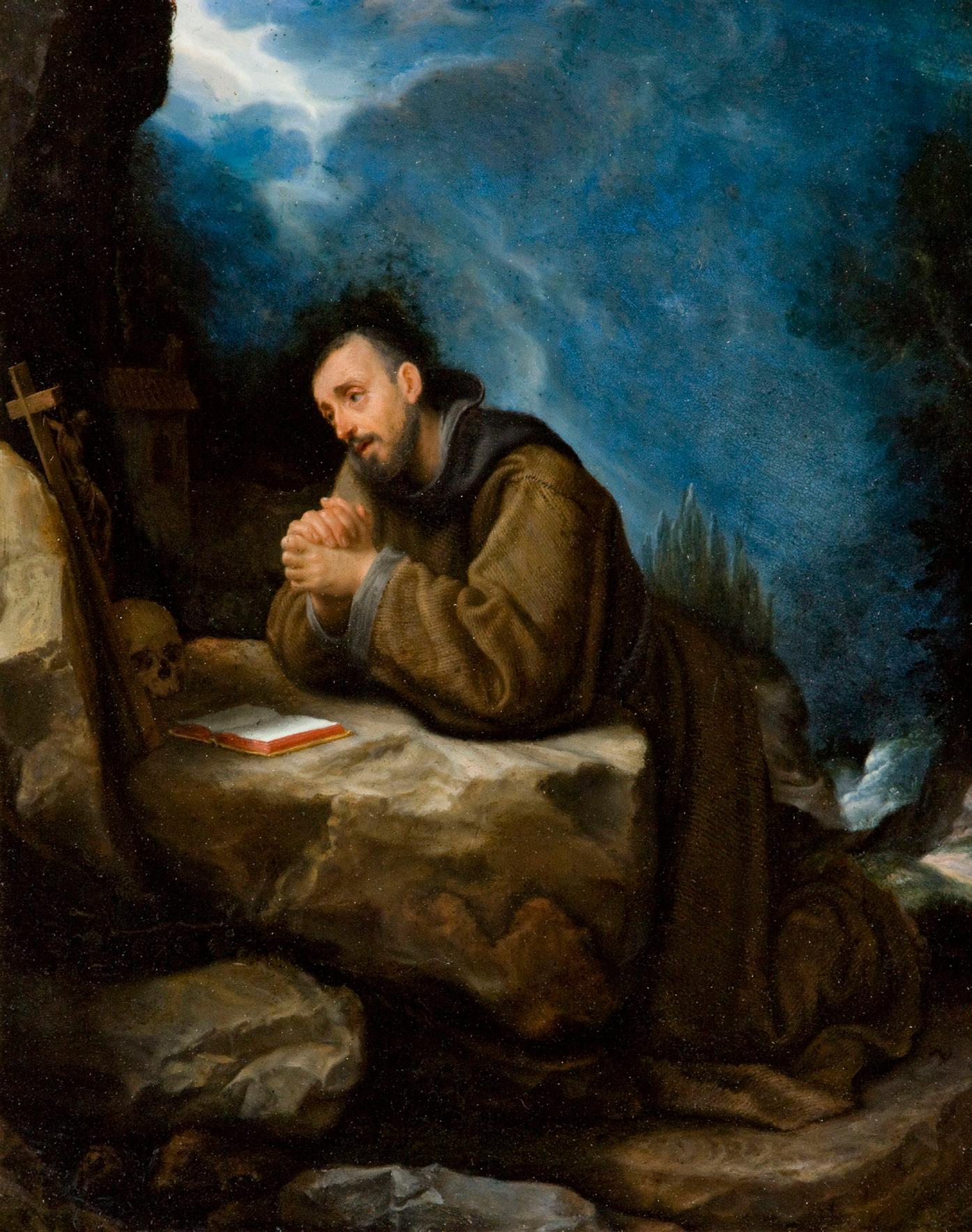 St Francis in Prayer by Cristofano Allori (1577-1621)
Oil on copper. BELUM.U26 ©National Museums NI Collection: Ulster Museum
St Francis in Prayer by Cristofano Allori (1577-1621)
Oil on copper. BELUM.U26 ©National Museums NI Collection: Ulster Museum
COLETTE HENRY ST FRANCIS IN PRAYER
after St Francis in Prayer by Cristofano Allori
Fragments of white light interrupt the blue. Illuminating your chapel as you pray. A humble rock as your altar, you kneel.
As sins and indiscretions fade away. You turn your gaze to the cross. Your prayer book as your compass.
Such humility. Such reverence. This life of poverty and devotion. St Francis, pray for us.
MAEVE MCKENNA DUPLICATE
after St Francis in Prayer by Cristofano Allori
Repent the brush and your father’s bowl of sepia bread. Repent prayers and the benign obedience to God. Repent the red pen to ink on the page’s blood edge. A close replica, repent, we use the same stroke. St. Francis, pray for me and me and me and me and me.
What strange affliction cursed your hands when you painted a Correggio, Cristofano?
Bloodshot at the outer eyes, a faithful penance in the fold of cloth sleeves over elbows supporting nothing but contrite flesh. The concrete tableau punishes you, Francis, a skull watching, dead as you will soon become. Sable hair is a portrait of manners on the brow of that nose, light a stunned degree cold as talent. This is no Borghese Gallery, fella. Educated and inspired, we view later from a distance our notebooks with pride, sipping pretend coffee from the absent VW café in the Botanical Gardens.
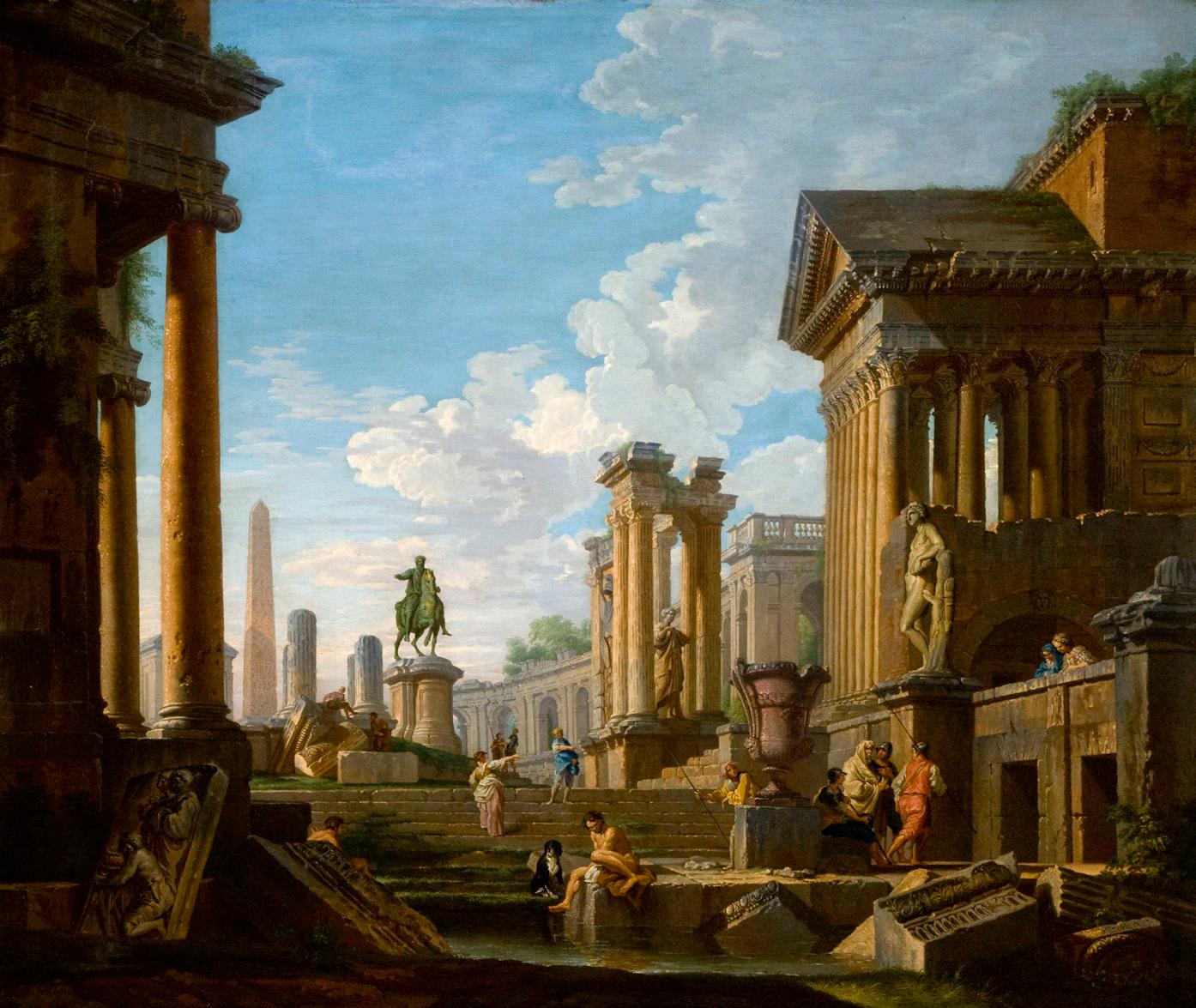 Imaginary View of Roman Ruins by Giovanni Paolo Panini (1691-1765)
Oil on canvas. BELUM.U117 ©National Museums NI Collection: Ulster Museum
Imaginary View of Roman Ruins by Giovanni Paolo Panini (1691-1765)
Oil on canvas. BELUM.U117 ©National Museums NI Collection: Ulster Museum
MATTHEW RICE CAPRICCIO
after Imaginary View of Roman Ruins by Giovanni Paolo Panini
Stillness of stone is a daydream –what jolts you to yourself comes from somewhere impossible to replicate, indifferent to marble, its immortality. What’s an obelisk to a layman if its purpose is forgotten regardless of what the future says, the justifying sun making real the glory, the waste, and bare among ruins, a foot hovering over water.
HAZEL NAUGHTON HOMECOMING
after Imaginary View of Roman Ruins by Giovanni Paolo Panini
I returned without you in the defeat of victory choked on my pulse as the jagged walls came into view looked for you in the wound of every tapestry the pools of blood along the steps and in the shadows where we stole our first kiss
but you are ash on the pyre and no god or prayer can unsully this life or rebuild it in my eyes
without yours full of the most beautiful lies about grey hair and dying side by side
at least everything else had the decency to descend into decay
TODDLER TROUBLE AT THE ULSTER
It was a risky move thirty minutes before closing, to agree conditions with a three-year-old—
my time on level four for fun time on five with pizza after. Hand clutching hand
she seemed to sense that I had sensed she would renege the pinky promise made on Botanic.
It started in the lifts, pressing all buttons, doors parting for no one at levels one two three four
before stopping at five. I got out.
In skilful synchronicity, she did not.
I panic took to stairs as she took the lift. Five three four three two before stopping at zero. Not even angelic smiles
masquerading mischief could calm my nerves. We finally eyeballed each other at 16:58.
No Renaissance to Romanticism, karma perhaps, for denying a squishy in the gift shop, but she still got Margherita.
SHARMA
BABITA
EKPHRASTIC DIALOGUE
Poet Tired already from my rounds of this museum, its many portraits of nobility, I see this woman, her strangely moony face, her sprawling child, and dog, and fine upholstery – I peer into her angled gaze and ask What does this writing underneath mean – AIL, CGS?
Painting It means, dear boy, that I’m bequeathed in lieu of tax, A ‘cultural gift’. A law in 1896 was made so – genius! –Art would stay in Britain. At that time, not compulsory That the Public, grubs like you, should see them, Artworks could be donated to a national museum (Held, likely, in their labyrinthine and unseen collection) And the money for which it would’ve sold at auction Would go in lieu of inheritance tax.
Poet Hm. Let me check you’ve got your facts straight… [He googles] Ah yes! Also known as ‘Ceti’ or ‘conditional exemption tax incentive’ – gee, that’s a neat trick!
Painting Isn’t it just!
Of course, for years the paintings sat gathering dust But in 1998 it was decided we had to be Open to the Public. One of Britain’s few remaining glories: Free museums, free tap water, and free lavatories.
Poet The last two are certainly a gift, I’m sure it’s not just me who’s joined the water cycle thus. I’m not so keen on art, I must admit, but yes, it’s great that anyone who wants can visit the museum – though I suppose it’s still a certain sort that’s there most often.
Painting The point is everyone has the chance
To go, who cares if it’s by and large the bourgeoisie?
Poet Sure... But I’m still a bit suspicious of this giving- paintingsinstead-of-paying-taxes lark. How do you square that, thinking materially?
BENJAMIN WEBB
Painting Easy-peasy lemon squeezy!
It’s as I say, poorer people get to stare At beautiful paintings -- like yours truly!
Poet Wouldn’t we ideally have paintings, yes, but also a working welfare state – an NHS with proper funding; decent benefits; cash to help with housing; environmental regulation; renationalised transportation; even funding for other arts?
Painting It’s amusing
To hear your gripes, dear boy. There is no magic money tree From which to pluck these golden apples. Nothing’s handed To you on a plate –
Poet What about these kids of landed gentry, or whoever gifts this stuff, avoiding taxes on the huge amounts their parents leave them? £40 million’s worth in 2020, from what I read...
Painting Now look, you’re getting a bit annoying. £40 million is nothing. Don’t pretend life’s even-steven: You’ve no idea how much money’s hid In offshore havens -- And most of it’s legal. At least with Ceti you get to see something in return.
Poet But it all just seems so medieval –like we poor peasants ought to clutch our hats and beam in wide-eyed gratitude...
Painting Yes, well, understand that paintings are assets, They are owned and individual. Your poems are, to be crude, Just sounds. They long to live rent-free inside our heads.
EMMA KANE
CASSANDRA SPEAKS
after Cassandra by Frederick Sandys
The power of prophecy. A cruel bounty. Listen! I speak the truth! Mark my words! Idioms evaporate like steam into the ether. Language carried by zephyr to the blue beyond. My predictions fall on deaf ears. I am trapped within the walls of wisdom. Drowning in knowledge. No rest. No escape. Imprisoned in my mind. No matter what I say I can’t make them believe. Dubbed unhinged. Labelled hysterical. My divination, ignored. Might as well be mute.
They drape amber around my neck to help me heal, turquoise at my throat for my mood. A garland of laurel leaves for strength. They dress me in robes of orange and green, reminiscent of the glow of the sun, of lush green fields. They say the darkness has taken hold of me. I am cursed with sight. Every time I close my eyes. Fates laid bare. The fall of Troy. There are things I know. To change the course. Nothing is fixed until it happens. Prevention is possible. Too late.
The smell of death. Wine, olive oil. The shell of you passes by. Gold coins for Charon on your eyes. You have shed your skin brother. Hades awaits. My soul cries. I throw back my head, open my mouth. My scream comes from deep within. Throat burns. A hollow cry. I make no sound. Blessed with beauty. My affliction. Always seen. Never heard.
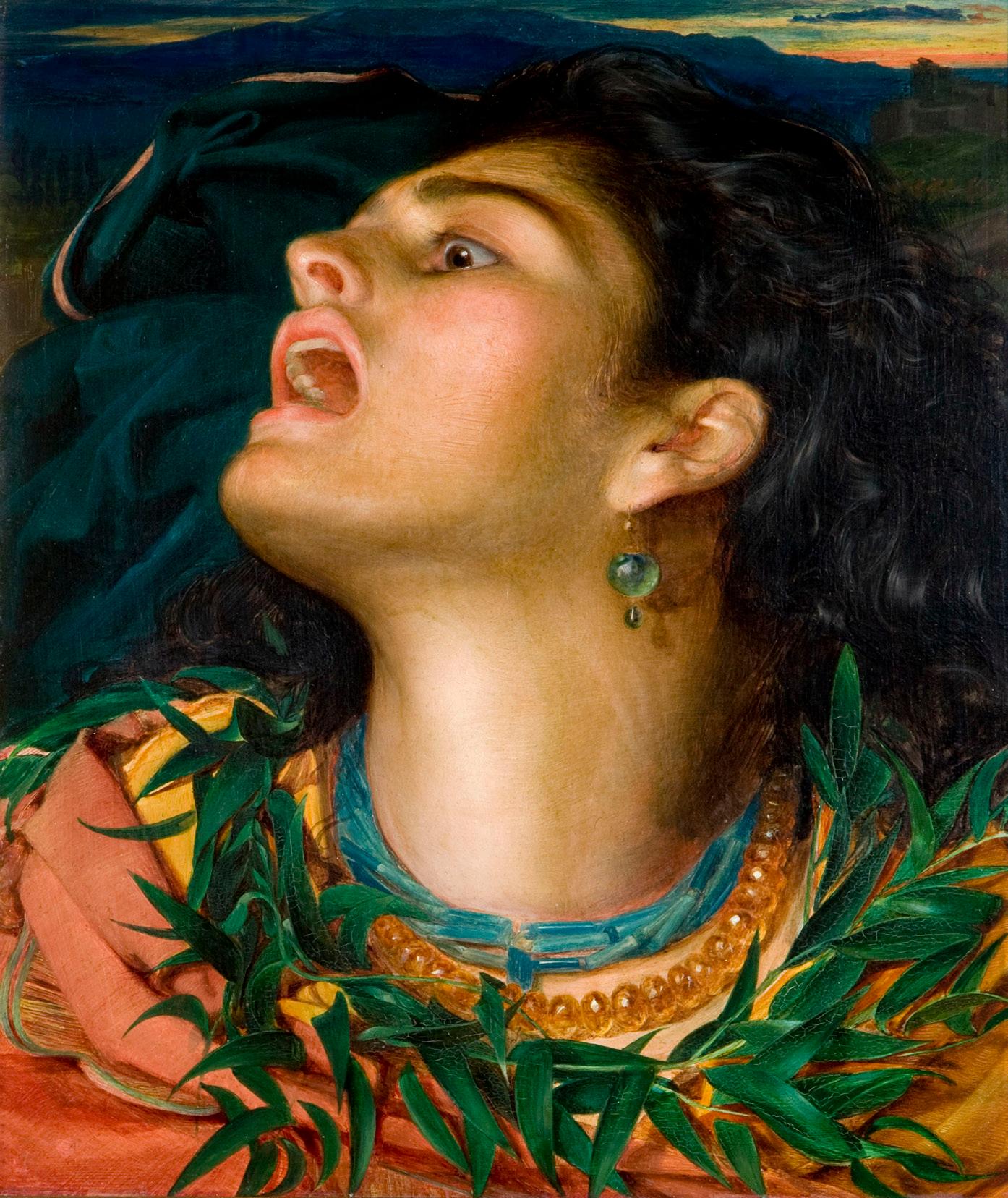 Cassandra by Frederick Sandys (1829-1904)
Oil on board. BELUM.U168 ©National Museums NI Collection: Ulster Museum
Cassandra by Frederick Sandys (1829-1904)
Oil on board. BELUM.U168 ©National Museums NI Collection: Ulster Museum
THE BATESON CHILDREN
after
The Children of Thomas Bateson by
“Goodness! You look like father.”
“You look like father!”
“Haw haw. You both look like father.”
“So do you.”
“We all look like father.”
Strickland Lowry
“I think the two of us are supposed to be like mother.”
“Well you’re not. Look, you’re the very same as father, here on the wall.”
“Oh yes, there’s father.”
“No, that’s grandfather.”
“No, sillies. That’s His Majesty.”
“Oh.”
“Why do you suppose I’m to point at this globe?”
“I don’t know. Travel?”
“Hmm.”
“Down, down now, there’s a good dog.”
“Ah yes, look. He’s dressed the boys as sailors. For we’ll be the travelling ones.”
“And what of us?”
“Well. Sister has her music, look, and you have your flowers, haven’t you.”
“I suppose. They are pretty flowers.”
Flowers.
The oak wood coffin. The church organ. In the warmth of her black dress, she’d been unable to find either the beat or the key of the tune. Everyone was kind. They didn’t mention her singing.
“Big sis, whatever is the matter?”
“Oh. It’s nothing.”
“You’re sure? I mean this is ridiculous. It can’t be complete. Look here. This is nothing like mother even. And these two? Why, they hung in our hall. He’d be done for plagiarism. It’s all just placeholder. It can’t possibly be complete.”
“I fear it is complete.”
“Impossible. I’ll tell father. Tell him he’s been had.”
“I fear we cannot.”
JOHN MORIARTY
“Why?”
“Because it’s happened already.”
“What has?”
“Everything.”
“What on earth d’you mean sis? Why so sullen and pale? Sing us that song, won’t you, it’ll cheer us all.”
“I’m sorry. It’s been sung. It’s all come true. The three of you left by boat for thenew world and never returned. I was the last left. I remember... visiting the graveyard. To see you, sister. Laid there, with mother and father. My hip? Yes, my hip was hurting. Throbbing.”

“Then what happened?”
She didn’t remember.
“I don’t remember.”
The Children of Thomas Bateson by Strickland Lowry (1737-1785) Oil on canvas. BELUM.U1664 ©National Museums NI Collection: Ulster Museum
ALEXANDRA WARD MATERNITY LEAVE
after Dawn of Christianity (Flight into Egypt) by Joseph Mallord William Turner
Neither speak as they trot trot trot along the never-ending road. They no longer notice the brush of the trees, or the calls of the birds, or the faces of those they pass. There is only the dust that has settled in their throats, and the sacred lulls of respite when the baby grows quiet.
The child’s mother, as she came to be known, only wonders at the heaviness of her breasts, and tenderly presses her thumbs into the folds of a stomach she no longer recognises as her own. She prays for a place to lay her head. She knows she shouldn’t complain – after all, she isn’t the one with calloused soles and weakened knees – but it hardly seems unreasonable to wish for a few hours in bed.
Night falls, and the sky burns red at the edges of the blue; it reminds her of a blood-smeared tunic, worn before, during and after birth. She tries to ignore the way it sticks to her thighs.
She looks down into the sea, tastes salt in the air, its grit on her lips. She doesn’t want to think about the home that is no longer hers, or the one they have yet to find. She merely thinks that they’d get wherever they’re going much quicker if they could only walk on water.
 Dawn of Christianity (Flight into Egypt) by Joseph Mallord William Turner (1775-1851)
Oil on canvas. BELUM.U224 ©National Museums NI Collection: Ulster Museum
Dawn of Christianity (Flight into Egypt) by Joseph Mallord William Turner (1775-1851)
Oil on canvas. BELUM.U224 ©National Museums NI Collection: Ulster Museum
 Allegory of Fortune by Lorenzo Lippi (1606-1665)
Oil on canvas. BELUM.U36 ©National Museums NI Collection: Ulster Museum
Allegory of Fortune by Lorenzo Lippi (1606-1665)
Oil on canvas. BELUM.U36 ©National Museums NI Collection: Ulster Museum
VIVIANA FIORENTINO FORTUNE
after Allegory of Fortune by Lorenzo Lippi
I meet you in a museum. With a turn of cards you unclose your celestial stature, inaccessible palmistry.
You talk to me in your voice of wax. It dissolves before landing on the shore of audibility, your oration on humans cleaves the impossibility.
You look at me, weasel face, your ebony irises challenge me with spades, hearts and numbers, rulers of the planet.
On you crashes a lost human game. Your chest is unadorned elegance, it makes swerve, even a meridian. I sway, prey for your cheating, cyan and amethyst.
But I dodge you, your life made of scaffoldings, I beg your monkey friend, if there is a possibility, can we have us as we are, in a moment of a kiss or a greeting.
HILARY MCDANIEL
THE THREE GRACES
after The Three Graces by Antonio Canova
Sculpting the marble, Canova thought, how will I make the eyes feel? His own hand smoothing the fesse as he carved the sloped curve of Thalia’s thigh, the lower swell and bloom of her buttock.
The sign in the museum says ‘do not touch’ because it is natural to want to spiral between their calves, embrace their swanned shoulders like real girls, these graces. Blow breath across their faces.
To sleep spent, around their feet like small children or morning glory vines, shining, joyful, blooming to will them alive.
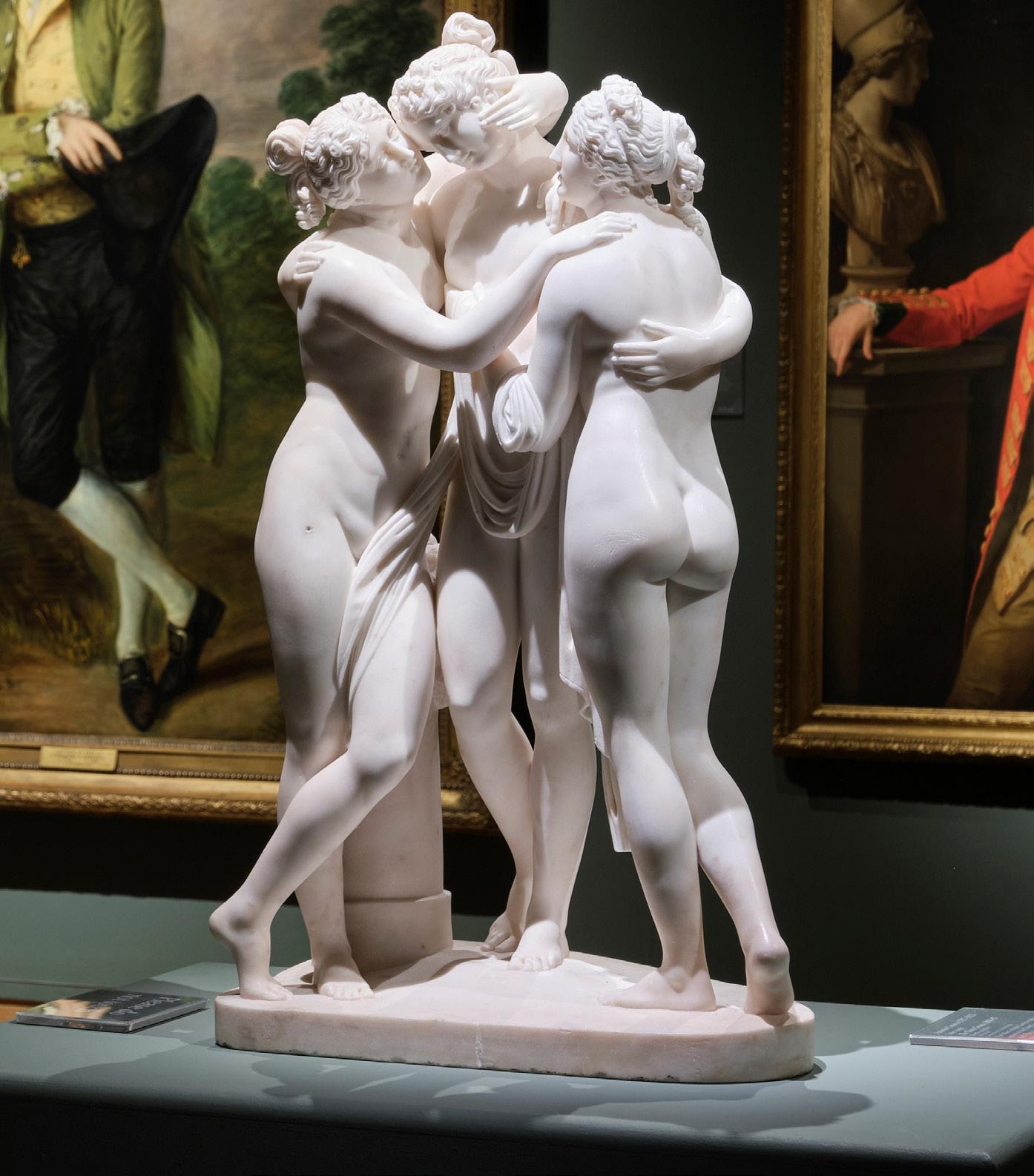 The Three Graces by Antonio Canova (1757-1822)
Marble sculpture. BELUM.4847 ©National Museums NI Collection: Ulster Museum (Photo courtesy of Simon Mills)
The Three Graces by Antonio Canova (1757-1822)
Marble sculpture. BELUM.4847 ©National Museums NI Collection: Ulster Museum (Photo courtesy of Simon Mills)
 An Emigrant Ship Leaving Belfast by James Glen Wilson (1827 – 1863) Oil on canvas. BELUM.u178 ©National Museums NI Collection: Ulster Museum
An Emigrant Ship Leaving Belfast by James Glen Wilson (1827 – 1863) Oil on canvas. BELUM.u178 ©National Museums NI Collection: Ulster Museum

 View of the Ferry and Castle of Narrow Water by Jonathan Fisher (died 1809) Oil on canvas. BELUM.U659 ©National Museums NI Collection: Ulster Museum
View of the Ferry and Castle of Narrow Water by Jonathan Fisher (died 1809) Oil on canvas. BELUM.U659 ©National Museums NI Collection: Ulster Museum
 Quiet by James (Jacques) Tissot (1836-1902)
Oil on canvas. BELUM.U2021.3 ©National Museums NI Collection: Ulster Museum
Quiet by James (Jacques) Tissot (1836-1902)
Oil on canvas. BELUM.U2021.3 ©National Museums NI Collection: Ulster Museum
 St Francis in Prayer by Cristofano Allori (1577-1621)
Oil on copper. BELUM.U26 ©National Museums NI Collection: Ulster Museum
St Francis in Prayer by Cristofano Allori (1577-1621)
Oil on copper. BELUM.U26 ©National Museums NI Collection: Ulster Museum
 Imaginary View of Roman Ruins by Giovanni Paolo Panini (1691-1765)
Oil on canvas. BELUM.U117 ©National Museums NI Collection: Ulster Museum
Imaginary View of Roman Ruins by Giovanni Paolo Panini (1691-1765)
Oil on canvas. BELUM.U117 ©National Museums NI Collection: Ulster Museum
 Cassandra by Frederick Sandys (1829-1904)
Oil on board. BELUM.U168 ©National Museums NI Collection: Ulster Museum
Cassandra by Frederick Sandys (1829-1904)
Oil on board. BELUM.U168 ©National Museums NI Collection: Ulster Museum

 Dawn of Christianity (Flight into Egypt) by Joseph Mallord William Turner (1775-1851)
Oil on canvas. BELUM.U224 ©National Museums NI Collection: Ulster Museum
Dawn of Christianity (Flight into Egypt) by Joseph Mallord William Turner (1775-1851)
Oil on canvas. BELUM.U224 ©National Museums NI Collection: Ulster Museum
 Allegory of Fortune by Lorenzo Lippi (1606-1665)
Oil on canvas. BELUM.U36 ©National Museums NI Collection: Ulster Museum
Allegory of Fortune by Lorenzo Lippi (1606-1665)
Oil on canvas. BELUM.U36 ©National Museums NI Collection: Ulster Museum
 The Three Graces by Antonio Canova (1757-1822)
Marble sculpture. BELUM.4847 ©National Museums NI Collection: Ulster Museum (Photo courtesy of Simon Mills)
The Three Graces by Antonio Canova (1757-1822)
Marble sculpture. BELUM.4847 ©National Museums NI Collection: Ulster Museum (Photo courtesy of Simon Mills)